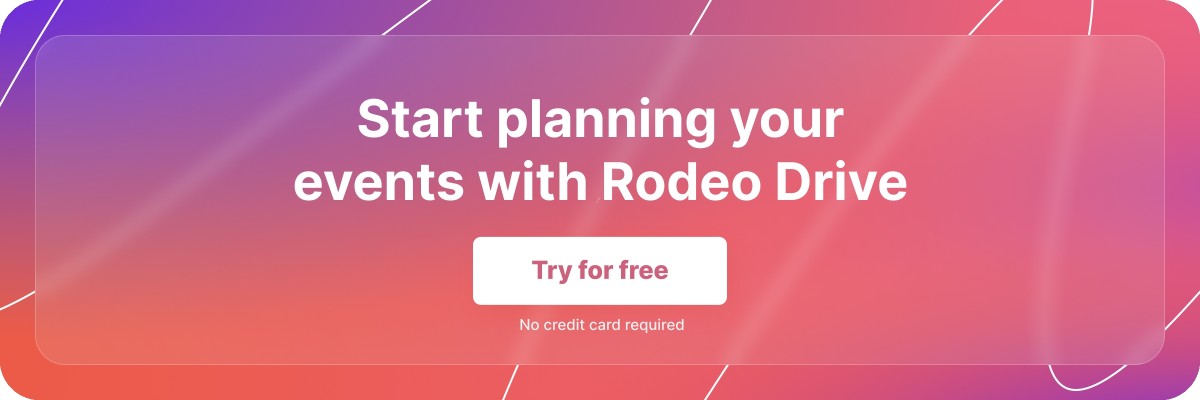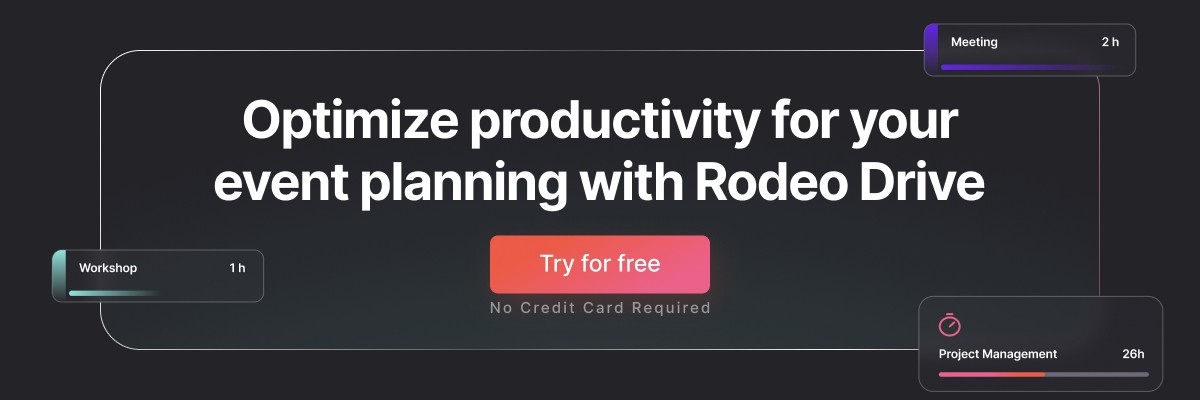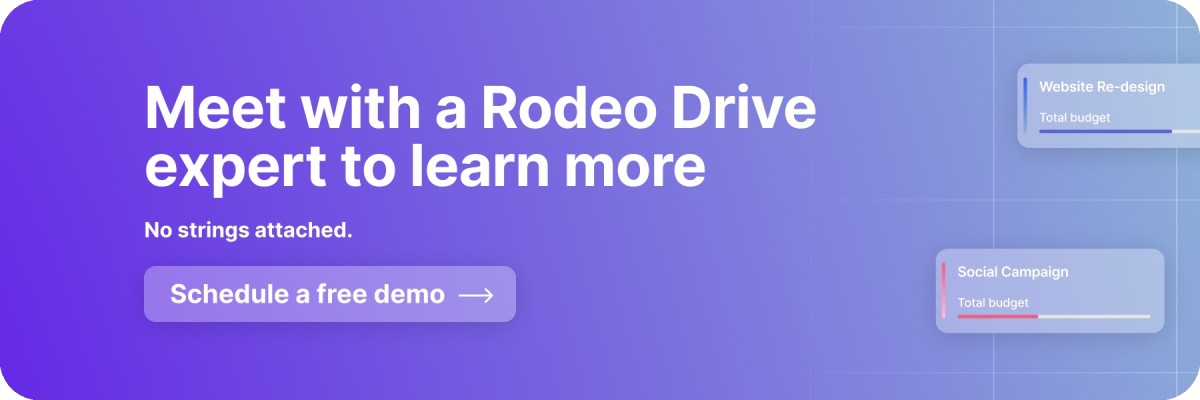12 Free Helpful Event Planning Templates
Event planning is a significant undertaking for most businesses. Like managing any project, numerous components must align flawlessly to ensure a successful outcome.
Whether you’re a seasoned event planning professional or just starting out, this guide will help you plan a successful event.
We’ll review why event planning is essential, what should be included in your plan of action, tips to choose the best event planning template, plus 12 free event planning templates so you can get started quickly.
Why is event planning so important?
Event planning is essential to organizing any gathering, whether it's a small business meeting with stakeholders, a social event, or a large conference.
One of the main reasons why event planning is so important is that it helps to establish objectives for the event. A well-planned event has a clearly defined purpose, and every detail must be thoroughly considered, from the venue selection to the choice of the keynote speaker.
By setting specific goals for your event, you can make better decisions about what needs to be included and, more importantly, what can be left out.
Another reason why event planning is so important is that it enables organizers to anticipate and manage potential risks and challenges.
No event is ever completely free of hitches and obstacles, but a thorough plan helps to identify these issues in advance, giving event organizers a chance to develop strategies for managing them effectively.
What to include in an event planning template
One of the best ways to stay organized during the planning process is to use an event planning template, which will serve as your guide and checklist during the entire process.
But what should you include in this template to ensure a smooth and successful event?
Let’s start by covering the basics such as including:
- The title of your event
- The date or dates
- Time
- Location
- The overall goal
Then, include a brief description, as well as any important notes for your team helping out during the event. Identify the desired outcomes of your event, such as networking opportunities, sales leads, or community-building.
This information will serve as the foundation for your planning process and will be essential for communicating with vendors, stakeholders, and attendees. You may also want to include logistical details such as catering, lighting, WiFi, and audiovisual requirements.
Next, you'll include a section for your event's target audience and desired outcomes. What type of guests do you expect to attend? Are they professionals, students, or the general public? How many guests do you anticipate?
Articulating and understanding your target audience will help guide your decisions regarding venue selection, guest speakers, content, and other aspects of the event.
Let's dig into some of the particulars of what to include in an event planning template.
Budget and financial considerations
The budget may be one of the most crucial elements of any event planning template. Without funding or sponsors, there won’t be an event. A comprehensive and realistic event budget includes all possible expenses, including venue fees, catering, decorations, audiovisual equipment, staff wages, and marketing resources.
Depending on the type of event, consider any potential sources of revenue, like ticket sales, sponsorships, or merchandise sales. Keeping a detailed and organized budget will ensure that you can make informed decisions throughout the planning process to keep costs in check.
In addition to the overall event budget, make sure to include a section for tracking invoices and payments. This can help you stay on top of vendor payments and ensure you don't miss important deadlines.
Don’t forget to also keep a contingency fund for unexpected expenses that may arise during the planning stages.
Timeline and task management
Creating a detailed timeline is another key component of a well-executed event planning template. Consider breaking down your timeline into several phases, such as pre-event, during the event, and post-event.
For each stage, include specific tasks that need to be completed, along with assigned responsibilities and deadlines, to ensure that nothing falls through the cracks.
Consider utilizing a project management tool like Rodeo Drive to streamline your task management process further.
With Rodeo Drive, event organizers are able to create tasks, assign responsibilities, and track progress in one place. You can even invite your event planning team members to collaborate, ensuring everyone stays in the loop and on schedule.
Vendor coordination and contracts
Chances are you are working with external parties and vendors for your next event. Your event planning template should have a section for tracking vendor details and contracts, including contact information, services provided, cost estimates, terms, and contract deadlines.
To help you keep track of vendor-related tasks, create a checklist of any additional documents or materials that need to be submitted to each vendor.
Communicating frequently and openly with your vendors will help ensure a successful and smooth event. Regularly check in with them to confirm details, ask questions, and address any concerns that may arise during the planning process.
Marketing and promotion
Creating a strong online presence and engaging with your target audience can effectively generate buzz and increase attendance.
Make room in your planning template to attach or link to a marketing plan that outlines your overall strategy, target audience, and marketing channels to be used(e.g., email, social media, print materials). Include a timeline for when promotional materials should be created, distributed, and monitored for effectiveness.
Post-event evaluation
Once your event is over, take the time to evaluate its success and gather feedback from attendees, vendors, and team members. A dedicated section in your template can help you identify areas of improvement and inform your planning process for future events.
Consider conducting surveys, focus groups, or one-on-one interviews to gather valuable comments for your post-event valuation.
Tips for choosing the best event planning template
When it comes to planning an event, having a quality event template to guide you can make a world of difference. There are numerous templates available online catering to various event types and requirements. So, how do you choose the best template for your needs?
Ease of use
Consider the needs of your team and select a user-friendly template. Not everyone is tech-savvy, or you must onboard freelancers right before the big event, leaving little time to explain the details of the template.
If you're using Microsoft Excel or Google Sheets, pick a template compatible with these tools.
Organized and well-structured layout
In addition, a visually appealing template with a well-structured layout and color-coded sections can make the planning easier for everyone collaborating on the project.
A clean and organized design can make a noticeable difference in navigating through the various event planning stages.
Key elements of an event planning template
An effective template for an event planner should cover all the significant aspects of your event.
Here are some key elements to look for to ensure you have a comprehensive and efficient event planning tool:
- Event budget: Your template should have a well-structured event budget section, allowing you to track the costs and resources necessary. The ability to allocate and categorize expenses will enable you to quickly identify areas where adjustments can be made to control costs.
- Timeline: Sticking to a timeline is crucial to ensure all tasks are completed in line with the event schedule. Look for a template that provides a detailed timeline, including milestones, deadlines, and dependencies.
- Task list: A comprehensive task list is another must-have for an effective event planning template. The list should cover all aspects of the event from selecting the venue and managing vendors to promoting the event and handling post-event tasks. Your chosen template should have an organized task list with clear responsibilities and deadlines assigned to every team member.
- Team communication: Make sure your template facilitates communication amongst team members through features like shared calendars, to-do lists, and integrated chat tools. This ensures everyone stays informed about the progress, upcoming tasks, and any possible changes.
12 free event planning templates to make your event a success
As promised, here are 12 free event templates to support every aspect of your event planning process.
1. Event budget template
Creating a budget for your event can be straightforward with simple gatherings but gets more complicated for bigger occasions.
An event budget template helps you keep track of all expenses and stay within your financial constraints. It includes various cost categories such as venue, catering, marketing, and registration fees and can be customized to suit your specific event's requirements.
Download the event budget template
2. Event planning checklist
Check, check, and double-check. A checklist is the event planner’s best friend. Nothing feels as good as crossing off the essentials that must be in place before, during, and after the event.
An event checklist provides a handy visual tool for tracking progress and accomplishing tasks and should be utilized when planning any major event.
Use our free checklist by clicking on the button below. The template is fully customizable to transform your checklist into anything from speaker management to venue plan.
Download the event planning checklist
3. Event timeline template
Timeline templates are crucial for visualizing your event planning process and ensuring that everything runs according to the event schedule. By using an event timeline template, you can break down each task into smaller timelines to see how events overlap with others, ensuring a smooth process with no conflicting elements.
Download the event timeline template
4. Event marketing plan template
A marketing plan is essential for promoting your event and generating buzz. It outlines key steps such as setting goals, creating a budget, identifying the target audience, selecting marketing channels, creating content, measuring outcomes, and more.
By using a template, you will be able to manage your marketing campaigns, ensuring a consistent and effective approach to marketing efforts.
Download the event marketing plan template
5. Event sponsorship template
Securing sponsorships is an important aspect of event organization, especially for nonprofit events. A sponsorship template can help you outline the benefits that potential partners can receive, making it easier to approach and secure them.
This event sponsorship template offers customizable design and content suggestions to help you assemble a compelling package for potential sponsors.
Download the event sponsorship template
6. Event registration form
Collecting attendee information is crucial for an event planner. However, you must comply with local privacy regulations.
A well-designed registration form can help make the process more streamlined. Our free event registration templates make it easy and quick for event organizers to create and customize forms for their attendees.
Edit and tailor the template to fit your needs and add your event’s branding.
Download the event registration form
7. Event program template
Also known as an itinerary, an event program outlines the event schedule of activities for your guests. With an event program template, you can easily outline the agenda for your conference, speaking engagement, company meeting, or any other important event.
Download the event program template
8. Event evaluation form
Gathering feedback from attendees is essential to refining and improving future events. Key areas typically evaluated include organization, venue, content, logistics, and overall satisfaction.
Download the event evaluation form
9. Event vendor contract template
Managing contracts with multiple vendors is a common challenge an event planner faces. Event vendor contract templates outline the terms and conditions of a vendor's provision of goods or services for an event, ensuring everyone’s on the same page.
Download the event vendor contract template
10. Event production schedule template
An event production schedule provides a detailed yet clear overview of your event's various sessions and activities and who's responsible. This free event agenda template is fully customizable to fit your event requirements.
Download the event production schedule template
11. Event seating chart template
Arranging and tracking seating assignments can be an important part of event planning for large gatherings. The event seating chart templates visualize the allocated seating arrangements to accommodate guests comfortably.
Download the event seating chart
12. Event run sheet template
A run sheet is a document that helps you keep track of the finer details of your event, such as timing, staffing, and equipment setup. This detailed, minute-by-minute breakdown of your event's schedule is essential for ensuring everything goes smoothly on the day of your event, offering you an easy-to-adapt rundown of everything that needs to happen during your event.
Download the event run sheet template
Utilizing these free event planning templates can help keep you organized, manage your tasks more efficiently, and ultimately make your event successful.
Explore our templates and take your event planning skills to the next level.
Use Rodeo Drive to plan your events better
If you’re interested in leveraging event planning as part of your business efforts, see what Rodeo Drive can do for you.
Rodeo Drive is an all-in-one tool that equips professionals with the features they need to make managing events easy. Our robust software can support your event projects at every stage, meaning you can spend more time visualizing and executing your plans and less time on time-consuming administrative work.
Rodeo Drive can streamline your project management workflows by helping you:
- Build in-depth budgets that update in real-time as your project progresses so you can track your actual expenses compared to your estimated budget
- Easily plan and assign tasks to your team members
- Track time spent on tasks and projects
- Create custom invoices and estimates and send them to clients directly from the Rodeo Drive
- Access a rich set of reports on metrics like project profitability, employee productivity, time registration, and more
With budgeting, estimating, invoicing, planning, time-tracking, and reporting all combined in one user-friendly tool, Rodeo Drive gives you a truly comprehensive event project management solution.
No need to invest in additional third-party software to make your team more productive and your projects more profitable.
Ready to test it out? Start your free Rodeo Drive account today. And to learn more about what Rodeo Drive can do for your business, schedule a call with one of our experts.









